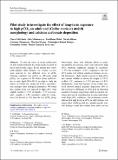Pilot study to investigate the effect of long-term exposure to high pCO2 on adult cod (Gadus morhua) otolith morphology and calcium carbonate deposition
Abstract
To date the study of ocean acidification on fish otolith formation has been mainly focused on larval and juvenile stages. In the present pilot study, wild-captured adult Atlantic cod (Gadus morhua) were exposed to two different levels of pCO2, 422µatm (ambient, low pCO2) or 1091µatm (high pCO2), for a period of 30 weeks (from mid-October to early April 2014–2015) in order to study the effects on otolith size, shape and CaCO3 crystallization amongst other biological parameters. We found that otoliths from cod exposed to high pCO2 were slightly smaller (− 3.4% in length; − 3.3% in perimeter), rounder (− 2.9% circularity and + 4% roundness) but heavier (+ 5%) than the low pCO2 group. Interestingly, there were different effects in males and females; for instance, male cods exposed to high pCO2 exhibited significant changes in circularity (− 3%) and roundness (+ 4%) compared to the low pCO2 males, but without significant changes on otolith dimensions, while females exposed to high pCO2 had smaller otoliths as shown for length (− 5.6%), width (− 2%), perimeter (− 3.5%) and area (− 4.8%). Furthermore, while the majority of the otoliths analysed showed normal aragonite deposition, 10% of fish exposed to 1091µatm of pCO2 had an abnormal accretion of calcite, suggesting a shift on calcium carbonate polymorph crystallization in some individuals under high pCO2 conditions. Our preliminary results indicate that high levels of pCO2 in adult Atlantic cod might affect otolith growth in a gender-specific way. Our findings reveal that otoliths from adult cod are affected by ocean acidification, and we believe that the present study will prompt further research into this currently under-explored area
Citation
Coll-Lladó , C , Mittermayer , F , Webb , P B , Allison , N , Clemmesen , C , Stiasny , M , Bridges , C , Gottler , G & Garcia de la Serrana Castillo , D 2021 , ' Pilot study to investigate the effect of long-term exposure to high p CO 2 on adult cod ( Gadus morhua ) otolith morphology and calcium carbonate deposition ' , Fish Physiology and Biochemistry , vol. First Online . https://doi.org/10.1007/s10695-021-01016-6
Publication
Fish Physiology and Biochemistry
Status
Peer reviewed
ISSN
0920-1742Type
Journal article
Description
Funding was provided by the Bonus Baltic Sea research and development programme (Art 185) BIO-C3 project, funded jointly by the EU and the BMBF (Grant No. 03F0682A), BIOACID project (Biological Impacts of Ocean Acidification: Grant No. 03F0655K) funded by the German Ministry for Education and Research (BMBF), and the EU AQUAEXCEL transnational access grant for aquaculture infrastructures. Part of the work was supported by the FINEAQUA-project (Grant Number 12212001) funded by the Program for the Future Economy (financed by the European Regional Development Fund, the Federal Republic of Germany and the state of Schleswig–Holstein), the Centre for Marine Aquaculture, Tromsø, and the Marine Alliance for Science and Technology for Scotland (MASTS) Small Grant initiative (SG330 and SG407), and their support especially by the staff of the centre for Marine Aquaculture is gratefully acknowledged. MASTS is funded by the Scottish Funding Council (grant reference HR09011) and contributing institutions. PBW would like to thank the Royal Society for the award of an Industry Fellowship. DGS is a Serra Húnter Tenure-Track lecturer.Collections
Items in the St Andrews Research Repository are protected by copyright, with all rights reserved, unless otherwise indicated.

